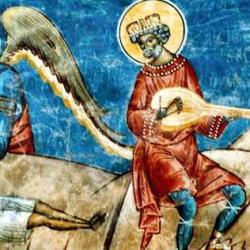Psalm 128 promises a fruitful home to the man who fears Yahweh. He will prosper from the labor of his hands, with no one plundering or taxing away his goods.
The assumption is that productive work is part of family life. The family is an economic unit, among other things, not only consuming goods but producing goods. Both Psalms 127 and 128 emphasize this. Psalm 127 emphasizes that our labor is fruitful and productive, our work is blessed, only under the blessing of the Lord. It says that our work is empty and vain unless we labor under the blessing of God. And Psalm 128 says that the man who fears Yahweh will eat the labor of his hands.
The Bible regularly lists this as a blessing from Yahweh, that we work and enjoy the fruits of our labor. When there is a gap between our work and enjoyment of the results, there is something wrong. This is one of the curses of sin: In sweat we eat bread, and often there is no bread even after we have sweated a lot. But for the one who fears Yahweh, the Lord restores the link between labor and enjoyment, between working and feasting.
That assumes, of course, that his hands labor. Paul condemns men who fail to support their families as “worse than infidels.” Work is not the whole of family life, but work is a part of family life.
Psalm 128 speaks of this productivity using the imagery of fruitfulness. The Bible, of course, contains a lot of plant imagery applied to persons. This begins just outside the garden when Yahweh tells Adam that the ground is going to produce thorns and thistles. Adam himself was taken from the ground, so there is a double meaning here. The actual ground is going to produce thorns and thistles, but the animated ground that is Adam is also going to produce thorns and thistles from his own body. And that’s what we find in the very next chapter. Adam’s eldest son, produced from the ground of his own body, is a thorn bush that tears at his brother and sheds his blood.
Throughout Scripture, there are many different kinds of plants and trees associated with men. But the division is basically between those trees and plants that produce something and those that don’t. Jotham’s parable in Judges 9 talks about the trees wanting a king, and all the productive trees – the vine, the olive tree, the fig tree – are too busy being productive to bother with running for office. So the trees finally get a briar to be king, and the briar destroys all the other plants. In Psalm 128 the promise is that the home that fears Yahweh will be full of fruit-bearing trees and not briars and thorns.
The man who fears Yahweh can hope that his wife will be productive, fertile in all that she sets her hand too. Obviously, she is fearing Yahweh too, and by fearing Yahweh and walking in His commandments, the wife becomes productive. The fruitfulness in view is partly the fruitfulness of children, because children are mentioned in the immediate context. But it is not merely the fruitfulness of children. As other passages of Scripture show us, the wife in the house is productive in the home. Proverbs 31 is ultimately not about an individual woman, but about Israel as a whole. Yet, the productivity of the woman of Proverbs 31 is a model for the productivity of wives and mothers. They are not to be consumers, but producers, working diligently as their husbands do.
Not simply productive and fruitful, but a vine in the heart of the house. His wife is fruitful, and fruitful like a vine, which produces grapes that produce wine. A fruitful wife at the heart of the house is like having a feast of wine at the heart of the house.
The plant imagery continues in the rest of the verse, as the Psalmist turns from the man’s wife to his children. Again, the general emphasis is on fruitfulness. The man who fears Yahweh can hope that his children will be fruitful, productive. His children are olive shoots, flourishing young trees that will grow into productive fruit-bearing trees. Olive oil is used for burning; children like olive trees are lights in the world. Olive oil is for anointing; children are priests and kings in training.
Psalm 127 ends with a note that is connected to this. There, the happy man is one whose children will not be ashamed or defeated, but whose children will contend with enemies in the places of judgment and justice, and emerge victorious. In a home where the fear of God sets the tone, children only survive to adulthood, but are victors, living faithfully and triumphantly.













